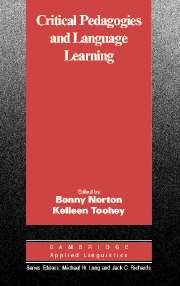Book contents
- Frontmatter
- Contents
- List of contributors
- Acknowledgments
- Chapter 1 Critical pedagogies and language learning: An introduction
- I RECONCEPTUALIZING SECOND LANGUAGE EDUCATION
- II CHALLENGING IDENTITIES
- III RESEARCHING CRITICAL PRACTICES
- Chapter 10 The logic of nonstandard teaching: A course in Cape Verdean language, culture, and history
- Chapter 11 Comic book culture and second language learners
- Chapter 12 Classroom interaction, gender, and foreign language learning
- Chapter 13 Living with inelegance in qualitative research on task-based learning
- IV EDUCATING TEACHERS FOR CHANGE
- Author Index
- Subject Index
Chapter 10 - The logic of nonstandard teaching: A course in Cape Verdean language, culture, and history
Published online by Cambridge University Press: 05 October 2012
- Frontmatter
- Contents
- List of contributors
- Acknowledgments
- Chapter 1 Critical pedagogies and language learning: An introduction
- I RECONCEPTUALIZING SECOND LANGUAGE EDUCATION
- II CHALLENGING IDENTITIES
- III RESEARCHING CRITICAL PRACTICES
- Chapter 10 The logic of nonstandard teaching: A course in Cape Verdean language, culture, and history
- Chapter 11 Comic book culture and second language learners
- Chapter 12 Classroom interaction, gender, and foreign language learning
- Chapter 13 Living with inelegance in qualitative research on task-based learning
- IV EDUCATING TEACHERS FOR CHANGE
- Author Index
- Subject Index
Summary
Cape Verdean students in the United States are all but invisible in educational literature and practice; although these students have a rich cultural and linguistic tradition, their language and culture have been understudied by researchers and ignored even in areas where there are large concentrations of students whose first language is Cape Verdean (CVL). In their homeland, an archipelago off the west coast of Africa, the language of schooling is still Portuguese, the language of Cape Verde's former colonizers. The rationale for this choice is that Portuguese is a world language with a greater body of written text and that Cape Verdean is a local language that does not provide access to economic or social status. In the United States, to the extent that Cape Verdeans are taught bilingually, the medium of instruction is often Portuguese as well. Thus, Cape Verdean students are largely schooled in a language that is associated with the history of colonialism and, in the United States, may be immersed in two school languages, neither of which is their home language. Often, their literacy and academic development are impeded by these linguistic influences and policies.
This chapter describes one course in the Boston area which aimed to demonstrate the benefits of teaching in CVL for Cape Verdean students. The class, an elective called Cape Verdean Language, Culture, and History (CVLCH), took place in a high school (hereafter called Hope High School [HHS]) where approximately thirty percent of the student population is Cape Verdean. It integrated the teaching of Cape Verdean language, culture, and history, providing a context for students to gain academic skills through the medium of their first language.
- Type
- Chapter
- Information
- Critical Pedagogies and Language Learning , pp. 181 - 200Publisher: Cambridge University PressPrint publication year: 2004
- 12
- Cited by



